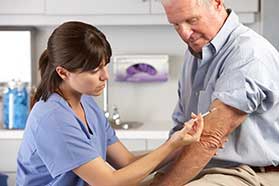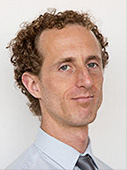Pneumonia Vaccine in Los Angeles, CA

Pneumonia is an infection that inflames the air sacs of one or both of the lungs. It is caused by germs (bacteria, viruses or fungi) or less commonly by aspiration (inhaling food, drink or saliva into the lungs). Viral pneumonia is most commonly caused by influenza and respiratory syncytial virus (RSV). Bacterial pneumonia is most commonly caused by Streptococcus pneumoniae bacteria (a bacteria also referred to as pneumococcus). Pneumococcus is also responsible for causing other health conditions such as meningitis and bacteremia.
For most, recovery from pneumonia takes a few weeks and can be controlled at home with rest and medication. For others, however, particularly babies, adults over the age of 65 and individuals with a weakened immune system, pneumonia can lead to dangerous health conditions in the lungs and brain.
According to the Centers for Disease Control and Prevention (CDC), pneumonia accounts for approximately 50,000 deaths and 1 million hospital visits each year. The two major causes of pneumonia (bacteria and viruses) are often preventable through several different vaccines.
To schedule an appointment with a healthcare provider in Los Angeles that can administer a pneumonia vaccine to you and your family, call (424) 365-1800 or contact Dr. Jeremy Fischer online.
Pneumonia Symptoms
The symptoms of pneumonia vary depending on age and the cause of the infection, but can include:
- Coughing (often with phlegm)
- High fever
- Difficulty breathing
- Chest pain
- Shaking chills
- Fatigue and weakness
- Nausea or vomiting
Pneumonia Treatment
Pneumonia treatment is dependent upon the cause of your pneumonia and its severity, and may include:
- Antibiotics (when caused by bacteria)
- Antiviral medication (when caused by a virus)
- Cough medicine and suppressants
- Oxygen therapy
- Over-the-counter pain relievers and fever reducers
For most, symptoms will subside within a few weeks, however, for infants and older adults, hospitalization may be required to provide breathing assistance, to maintain a healthy heart rate or to regain a normal temperature.
Pneumonia Prevention
Proper prevention involves effective pneumonia vaccination. There are several different types of vaccinations you may be recommended in order to prevent pneumonia which include:
Pneumococcal vaccination: There are two types of pneumococcal vaccinations to prevent pneumonia caused by Streptococcus pneumoniae: pneumococcal conjugate vaccine (PCV13) and pneumococcal polysaccharide vaccine (PPSV23). PCV13 is considered the new pneumonia vaccine and is designed for infants and adults over the age of 19 who have a high risk of contracting pneumonia, and can protect vaccinated individuals against 13 of the 90 types of pneumococcal bacteria. PPSV23 is designed for adults over the age of 65 and children between the ages of 2 and 19 who are at a high risk of developing heart and lung diseases, and can protect vaccinated individuals from 23 of 90 types of pneumococcal bacteria. The CDC recommends adults aged 65 and older receive both the PCV13 vaccine and the PPSV23 vaccine to provide the most protection.
Hib vaccination: This vaccine can help to prevent disease caused by the bacteria Haemophilus influenza type b (Hib) which includes pneumonia, cellulitis, bacteremia, epiglottitis and meningitis. Vaccination begins in infancy and is administered in a series of 2 or 3 shots (depending upon the type of vaccine used). A booster dose, to be administered at the age of 12-15 months, may also be recommended.
DTaP vaccination: Pertussis, commonly referred to as whooping cough, is a contagious respiratory tract infection that could lead to pneumonia. DTaP vaccination to prevent whooping cough begins in infancy when a child is 2 months, and requires a 5-dose series.
Varicella vaccination: Varicella, commonly referred to as chicken pox, is a common childhood disease that could lead to pneumonia as well as brain damage and skin infection. The varicella vaccine can help to prevent chicken pox and requires 2 doses, one between the ages of 12 and 15 months, and another between 4 and 6 years old.
MMR (measles, mumps and rubella) vaccination: Measles, a viral infection that can occur in children, can also lead to pneumonia, brain damage and seizures if left untreated. The MMR vaccine helps to prevent measles. This can be take in conjunction with the varicella vaccine at the age of 12-15 months, and again between 4 and 6 years old.
Influenza vaccination: Influenza, commonly referred to as the flu, can wreak havoc on your health and lead to pneumonia. Most children and adults hospitalized with influenza pneumonia have not received influenza vaccination like the yearly flu shot or the quadrivalent flu vaccine. The type of flu vaccine your healthcare provider recommends depends on your age and current health status.
Your healthcare provider can review the pneumonia vaccine schedule with you during your appointment as well as discuss side effects of the pneumonia vaccine, frequency and other preventative approaches.
To further reduce your chances of developing pneumonia, consider smoking cessation and lifestyle changes to your diet and physical activity which can have an impact on underlying medical conditions like diabetes and heart disease. Strengthening your immune system and practicing good hygiene (like regularly washing your hands) are also vital preventative approaches to fight against pneumonia.
For more information or to schedule an appointment with a healthcare provider in Los Angeles to receive your pneumonia vaccine, call (424) 365-1800 or contact Dr. Jeremy Fischer online.
Vitality Integrative Medicine
Address
4849 Van Nuys BlvdSuite 104
Sherman Oaks, CA 91403
(424) 365-1800
www.vitalityintegrative.com
Hours
Mon:
8:00 am - 6:00 pm
Tue:
8:00 am - 6:00 pm
Wed:
8:00 am - 6:00 pm
Thu:
8:00 am - 6:00 pm
Fri:
8:00 am - 6:00 pm
Sat:
8:00 am - 12:00 pm

